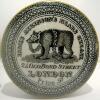Riomouse911
Member
I get the idea of removing oil-grease for a hunting gun in sub zero weather. That stuff certainly will gum up to the point where functionality is hindered or even stopped, but even then dry lube would be a great idea. For a duty or defense gun, the same goes. A non-congealing dry lube in place when its arctic-like outside.It was a premium lamp oil back in the day, not sure about lubing qualities.
That's even a century old.
Like someguy2800 says, it gets a bit chilly in Minnesota ya know. During deer Season, I'd remove all oil & grease from my deer guns, and use powdered graphite. Nothing at all also works at those temperatures. Just as he's saying he's not telling people not to switch to the way he runs his guns, I'm certainly not going to tell him he has to lube his guns. Seems to work for him.
But purposely not lubricating the moving parts on firearms and running them bone dry as a matter of daily practice? Ouch.
Those are his guns, he certainly can do what he wants with them. But I will respectfully disagree with the posters statements about “most modern guns not needing lubricant at all,” and I will suggest that anyone considering running any of their guns bone dry to seriously think twice if they expect to rely on it to function correctly. (Be it a new gun or old).
Stay safe.






